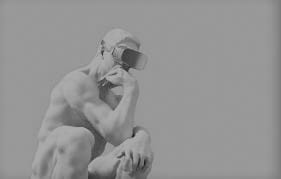Interview with Caroline Rousset, Smart Analytics Director at Micropole
The health crisis has led many companies to rethink the way they operate, notably by implementing telecommuting. How have working methods and project management changed? How do you maintain the link with teams, clients and partners from a distance? Answers from our #InnovativePeople Caroline Rousset, Smart Analytics Director at Micropole.
Since our country went into lockdown, how are you managing the impacts of this health crisis?
We are taking one step at a time and trying to take a lot of distance. The situation is unprecedented: we can't really say that we were prepared, even though we are a company by nature digital and used to managing teams that are not at our side but at our customers'. We had some facilities, we switched to teleworking with our teams in less than 48 hours without any major problems. Up until now, we were driving on a highway with GPS, and we switched in one weekend to an unmade road in unknown territory. The most important thing is to get your head out of the handlebars, prioritize the risks and not let yourself be overwhelmed by this new context. Things are changing very fast, we also have to keep in mind that each week will bring us its share of unforeseen events and be aware that this could impact our overall view. In reality, it is not only a crisis but rather a succession of crises because it is a whole set of things that we must manage.
What has the current crisis changed in your project management?
Two months ago, the idea of 100% telecommuting for most of our clients was inconceivable. Today, it is possible. Of course, not all projects have been impacted in the same way. For some, we already had a well-established remote organization vis-à-vis our customers; for others, on the contrary, we already had a strong proximity, notably maintained by an on-site presence. In all cases, our project teams had to reorganize internally to switch to a remote mode of operation, with full responsiveness and agility. No more project meetings at the coffee machine or looking up to see if someone is available to discuss a particular issue. Working remotely is an opportunity to manage projects in an even more formalized way and to adapt our communication methods. This requires more organization and planning, but distance also leads to a loss of spontaneity in exchanges.
Have the ways of working changed with your employees? If so, in what way?
Yes, because there is a real culture of oral communication at Micropole. We are used to having many informal discussions at the coffee machine. The morning coffee with my team is frankly the ritual I miss the most. Most of our work habits and reflexes are potentially challenged by this health crisis. We have had to adapt, but we are lucky to have small project teams that know each other very well. The period we are going through is also upsetting the codes of our meetings. I no longer conduct meetings with my teams only with several people, but I take the pulse more one to one. Video conferencing is nice, but beyond a certain number of participants, it quickly becomes unmanageable and counter-productive. I notice that some employees are reluctant to call, because it can be more intrusive in the relationship: you don't know if someone is focused on a specific task at a specific time, so the number of written exchanges literally explodes. The most important thing is to open up the discussion, to stay open and to encourage two-way communication. This is what is expected of a manager, because the crisis raises new questions every day and not all employees are affected in the same way.
From a distance, how do you create an environment conducive to collective intelligence?
This is undoubtedly the most complex thing to maintain. We know how to transmit information and how to manage small committee meetings, but it is much more complicated to move towards collective intelligence from a distance by benefiting from an individual's view on a specific point. In particular, we have set up presentation sessions for teams, adapting their frequency and time slots. In this time of pandemic, we are increasingly focused on people. By placing ourselves in a position to listen and observe reactions, we are developing the foundations for a better quality collaborative game, based on collective intelligence, agility and trust. This crisis provides an opportunity to initiate a new managerial paradigm and to develop a good collective dynamic in a different way. By necessity, this period will have beneficial effects on our way of working: it makes us move from collective work to working together.
How do you maintain the link with your customers and partners from a distance?
The observation is the same as with the teams: I find that the period changes our relationship with others, there is a lot of empathy and benevolence on all sides. I find that customer relations are also becoming much more human, personal and spontaneous, less self-serving. More than ever, we have entered an era where there is even more room for the expression of emotions but also of values. The current situation is experienced, shared and discussed: everyone is experiencing, on an individual level, the same crisis and the same retreat at the same time, and this inevitably creates a link.
How do you see the end of the crisis and are you preparing for the recovery?
I am not sure that we can talk about a "crisis exit" today, because the situation will get longer in time. We have seen, in the short term, this temporary situation managed in an emergency with the confinement, and we are going to enter during May in a second stage which is likely to last, perhaps with less limitations, but the social distancing will always be necessary. How many stages will there be? Nobody knows. The priority is to revive activity DURING the crisis. Our environment is going to be permanently modified and it is to this new environment that we will have to adapt by solving the team proximity-physical distancing equation. No more kissing every morning, we have to prepare ourselves for something different and lasting. Our ways of working and communicating are bound to evolve and put our ability to adapt and create links to the test. These changes are also new opportunities and can become a real innovation factor allowing our customers to evolve. Real innovation can only work in teams, thanks to the bounce of ideas based on the elements - the material, the environment, the technologies, etc. - at hand. - available. I like to think of a shaker to represent innovation: a concept here, a technology there, you mix all the ingredients at your disposal, and BINGO you have a new concept and/or a new use. And since nothing is lost and everything is transformed, add a new ingredient and a whole new palette of flavors opens up to our customers: digitalization, customer journey, employee experience... The field of possibilities is infinite!



